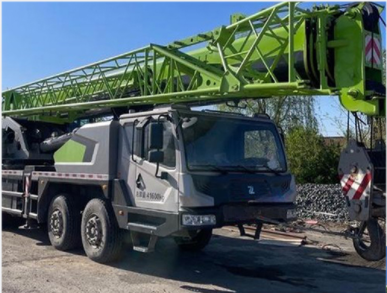This comprehensive guide explores the essential aspects of choosing the right 1 ton overhead crane for your specific needs. We'll cover key features, considerations for various applications, and factors influencing your selection process. Learn how to ensure you select a safe, efficient, and cost-effective solution for your material handling requirements.
Single girder 1 ton overhead cranes are a popular choice for lighter-duty applications. They are generally more compact and less expensive than double girder cranes. Their simpler design makes them easier to install and maintain. However, their load capacity is limited compared to double girder options. Consider a single girder system if you require a cost-effective solution for lifting lighter loads within a smaller workspace. Many manufacturers offer a wide range of single girder cranes to suit various needs. Choosing the right one depends heavily on your specific application's load requirements, span, and lift height.
Double girder 1 ton overhead cranes offer a greater load capacity and improved stability compared to single girder systems. This makes them suitable for more demanding applications where heavier loads or more precise lifting is required. While the initial investment might be higher, the increased durability and safety features often justify the cost over the long term. For applications needing superior strength and reliability, the extra expense of a double girder system can be well worth the investment. The added stability is particularly beneficial in environments with fluctuating loads or challenging working conditions.
The load capacity, expressed in tons, is the maximum weight the crane can safely lift. A 1 ton overhead crane is suitable for loads up to 1 ton. The duty cycle refers to the frequency and intensity of crane operation. Heavy-duty cranes are built to withstand frequent and intense use, while lighter-duty cranes are suitable for less demanding applications. Accurately assessing your duty cycle is crucial to selecting a crane that meets your operational requirements and longevity expectations. Mismatching the duty cycle to your application can lead to premature wear and tear, or worse, equipment failure.
The span refers to the horizontal distance between the crane's supporting columns. The lift height is the vertical distance the crane can lift the load. These dimensions must be carefully considered to ensure the crane fits within your facility's layout and operational space. Precise measurements are essential to avoid compatibility issues during installation and operation. Improperly sized cranes can hinder workflow and potentially cause safety hazards.
1 ton overhead cranes can be powered electrically or manually. Electric cranes offer greater lifting speed and efficiency, particularly for heavier or more frequent lifting. Manual cranes are simpler and more affordable, but they require more manual effort and are suitable only for lighter loads and less frequent operation. Your choice of power source will significantly impact the crane's overall functionality and operational costs. Electric power offers greater efficiency, but manual operation provides a more economical, albeit physically demanding, solution.
Regular maintenance is critical for ensuring the longevity and safe operation of your 1 ton overhead crane. This includes routine inspections, lubrication, and any necessary repairs. Safety features such as load limiters, emergency stops, and overload protection are vital for preventing accidents and ensuring the safety of personnel. Adhering to safety regulations and best practices during crane operation is paramount. For more information on maintaining your equipment, refer to the manufacturer's instructions and consider contacting Suizhou Haicang Automobile sales Co., LTD for expert assistance.
Selecting a reputable supplier is crucial. Look for companies with experience, certifications, and a proven track record. Consider factors such as their customer support, warranty offerings, and after-sales service. A reliable supplier will provide support throughout the selection, installation, and maintenance processes, ensuring a smooth and successful experience. Consider seeking out suppliers who can provide comprehensive solutions that include installation, training, and ongoing maintenance support.
| Feature | Single Girder Crane | Double Girder Crane |
|---|---|---|
| Load Capacity | Generally lower | Generally higher |
| Cost | Lower initial investment | Higher initial investment |
| Stability | Lower | Higher |
Remember to always consult with qualified professionals and adhere to all safety regulations when working with overhead cranes.












